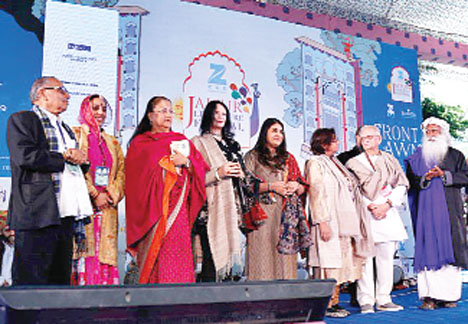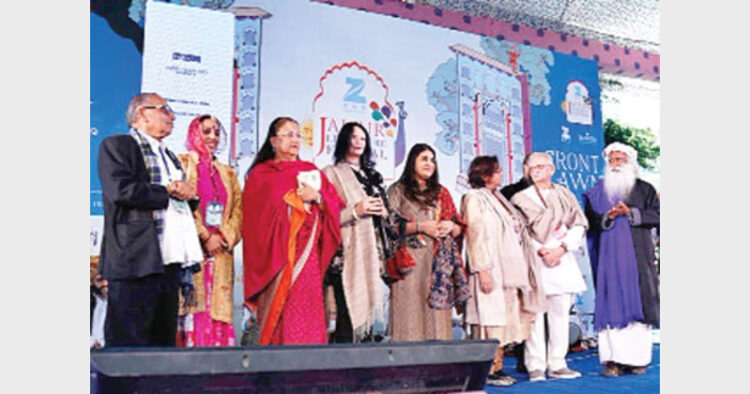 Jaipur Literature Festival is not new, what was new is the effort to bring people from different viewpoints on one platform to share their thoughts and ideas and opening up of a new window. This is the true tradition of literary festival
Jaipur Literature Festival is not new, what was new is the effort to bring people from different viewpoints on one platform to share their thoughts and ideas and opening up of a new window. This is the true tradition of literary festival
Khushboo Agrahari in Jaipur
Literary festival throughout the ages has always acted as eye-openers for the society. The Jaipur Literature Festival (JLF) is a one of its kinds, the event which celebrates the art, intellect and thought belong to different schools with a very special flavour of its own. And it is needless to say the world’s largest free event has sprung its surprises this year, ranging from ‘twice told tales’ to ‘politics of literary translation’ to the festival directors around table to a myriad of other subjects.
Rajasthan Chief Minister, along with the directors of JLF and other delegates, inaugurated the tenth chapter of the festival. A blend of local Rajsthani folk songs and dances and reminisces about the 10 year journey of the festival added more colour to the event. The keynote address by famous poet and filmmaker Gulzar and fmous American poet Anne Waldman’s beautiful rendition of the verses of her latest poetry were the highlights of the inaugural session.
The carnival spirit was exuded not merely from the hustle and bustle of the thronging crowd, the varieties of attire, costume wear and live fashion on display but reflected the magnificent obsession enjoyed by the participants from all corners of the world. The five day literature festival had a lot more to explore with many different sessions in each day for the hogged eager crowds.
Insightful debates, arguments and discussions that one could hope for in a talk were the features of the session in which vociferous and passionate speakers like Swapan Dasgupta , Suhel Seth to Professor Ashutosh Varshey debated on truth, post truth era that moderated by Barkha Dutt. Another panel of overseas journalists like Luke Harding discussed about the Snowden files and offered various narratives of the life of the world’s most wanted man.
The issues ranging Civil Rights to Dalit Rights, feminism to gender equality were highlighting the kind of misogyny ingrained in some regions in our country and how it permeates all the levels of society, were discussed in a debate. Calling out the toxic masculinity and sexism, the authors like Amrita Tripathi and others expressed their views and opinions.
As it was inevitable, a session discussed the demonetisation where Suhel Seth spoke in favour of the landmark decision and thanked the Prime Minister for the splendid job. In
another session titled ‘Gambits and Game Changers’, the speakers tried to relook at the Indian economy from different angles. British Journalist John Elliot opened the floor for discussion by asking if PM Modi has created a crisis with demonetisation. The speakers presented mixed views raising questions over transparency in clamping down on tax defaulters and the current condition of tax compliance.
In a session ‘Page Mightier than the Screen’, the Man Booker prize winning novelist and screenwriter Richard Flanagan spoke about the the onslaught of digital media in the last decade that has made printed fiction an endangered species. With moderator Swapan Dasgupta and a few other intellectuals as panelists discussing on story of the world’s most infamous diamond ‘Kohinoor’, the session drew a huge crowd.
An interesting session with Indian Journalists Sudhir Chaudhary and Rohit Gandhi as panelists discussed about the truth of the newsrooms and observed that the feeling of distrust and cynicism prevails not only in India but also abroad. Talking about the paid news and political interference in the media organisation, journalist Rohit Gandhi said ‘With the level of technology available today, a lie can be identified within minutes.’ He did clarify however there is a credibility deficit in some sections of the system. Sudhir Chaudhary talked about the tone and tenure of reportage. Emphasising on the lack of honesty and transparency in news he said that there should be more space for reasoned, calm and calibrated reporting.
On the second day, the festival ended with one of the much awaited sessions ‘Of Saffron and the Sangh’ where two national office bearers RSS were invited to present their views. RSS Akhil Bhartiya Prachar Pramukh Dr Manmohan Vaidya and Sahsarkaryavah Dattatreya Hosabale made their debut by taking some tough questions and presenting the ideology of RSS and its views on various issues discussed.
Kicking off the conversation, the duo put forwarded the core ideas and beliefs of both the work and philosophies of the Sangh as Hindutva and Nationalism.
Further while explaining these two terms in terms of Sangh parlance Vaidya said, “Hindutva is India’s character, origin and vision. We believe in unity in diversity. Accommodating all religion is Hindutva.” It was not about religion but as much as a way of life. India is spiritual democracy. Equal rights should be given to all, he added.
Shri Dattatreya Hosabale defined nationalism as patriotic sentiment and allegiance to one’s country. He said, “We must all be united as one nation. Rashtra connects people all together. One shall not lose faith in Rastra.”
Answering to questions regarding RSS’s views on political violence, Hosabale replied, ‘RSS do not support any violence. We are law abiding citizens.’ Speaking on the issue of Kerala where Sangh workers have been murdered on routine basis, he said, ‘RSS activists have been killed in fair number till date. Women and children are burnt alive. But what has the Kerala Government done about it.’
‘The violence is worsening in the state and the government has not been able to do anything. We are organising programmes. Media is not covering it. People are not able to know the realities. I appeal to the Kerala government to perform its duty,’ he added.
Taking jibe at the leaders and the groups who have boycotted the event and staged protest against the invitation extended to RSS leaders at JLF Shri Hosabale asked, “Where are those so called ‘tolerant’ people? What are they doing for the people of Kerala?” When asked on the issue of caste system and reservation policy. Manmohan Vaidya explicitly said, “We support reservation. But we are not in favour of religion based reservation.”
In response to a question how far the RSS have achieved the goal of the founder of the organisation Dr Hedgewar who dreamt of a united nation, Shri Vaidya said, ‘RSS is organising the society and not the organisation within the society. We believe in a spiritual based life vision. We are uniting people as one nation. People should be strong enough to respond to the problems and not only be dependent on the Government.”
Another was the unscheduled session of Taslima Nasreen who made an unexpected visit to the festival with police escorts. On her visit on the last day of the festival, she reiterated her stand against all kinds of fanaticism. She did not hide her love for India and also extended her support for Uniform Civil Code. Coming down strongly on those who claims to be secular she said “People talk about secular country. What do you mean by Secularism? Secularism means that you have to encourage Muslim fanatics who issue fatwas against people.’ Further she said, whatever crimes muslims commit they will not be punished rather the victims gets penalised.’ Later when it was reported outside the venue, some members from the Muslim community raised slogans against her.
Sharing his experience with Organiser, Pamarty Venkataramana, a poet and an amicus curae of Supreme Court, said, “It is a pleasure to watch vivaciousness and versatility of the people from the state of Rajasthan and our national culture.” This year JLF saw speakers from right wing to left, a perfect blend of views coming from all corners and section of the society.














Comments